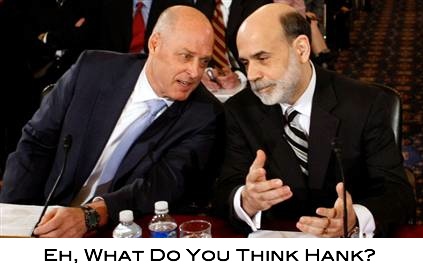The Meeting
Today, Ben Bernake and Henry Paulson were questioned in front of Congress to discuss the overhaul of our current financial regulatory system. With the obvious stress in the financial markets, it’s obvious that Americans are getting worried. Consumer confidence continues to get pummeled and the only news that is being told is the stuff that keeps grown adults up at night (okay, not really… but seriously – it’s out of control).
The Main Agenda
One main concern of the meeting was the strength of Fannie Mae and Freddie Mac, the United State’s largest mortgage providers (or GSEs). The concern is that they don’t have enough liquidity to handle the defaults on the loans that they’ve originated. Paulson was extremely quick to say there are no concerns with Freddie and Fannie at this point. Because of this statement, I’m going to explain why I’m slightly concerned (this isn’t meant to scare you, it’s just to explain what has happened in the last two years).
My Opinion
First off, It’s my opinion that the government would never let Fannie Mae or Freddie Mac collapse. With that said, there were some super risky loans that were originated by Fannie and Freddie. Specifically, Fannie Mae with their ‘Community Accommodation program’ and ‘Flex 100 program’. I’m not saying these are guaranteed to default. I can say that these were some extremely high risk guidelines that they were lending by (it goes without saying, the loans no longer exist).
The following loan was closed with zero money down.
- 599 FICO
- 64% Debt-to-Income Ratio (yes, before taxes are taken out).
- $100 in a checking account. No other reserves.
- $100 Earnest Money.
- 6% seller paid closing costs and pre-paid items.
- The buyer received their $100 check back at closing.
This loan also closed with $500 down.
- 560 FICO
- 56% Debt-to-Income Ratio (again, before taxes – and they would have probably gone higher).
- $500 Earnest Money.
- $1000 in a checking account.
- 3% seller paid closing costs and pre-paid items.
- Again, no money due at closing. They were only required to have $500 in the deal.
Not kidding. Scary stuff? Yes.
For a while there, the money was flowing as long as the mortgage insurance company would write the PMI policy on the client. On the second scenario, private mortgage insurance was $347 on a $100,000 home. Do you think they knew it was a risky loan? Yes. It’s the credit score stupid. (Not you, the lender). Every loan originator in the country knew these loans were crazy. If subprime lenders wouldn’t take them, why would the big dogs Fannie and Freddie? Well, the short answer is because they insured 20% of the purchase price by the PMI companies.
Getting To MY Point
The loans Fannie and Freddie were closing were risky. No doubt about it. You may be concerned about Fannie and Freddie, but watch the PMI companies first. Once you see them struggling after paying out their claims, you’ll see the Fannie and Freddie homes going to auction. THATS when you’ll see the huge write downs and impact on the secondary market. Remember, it takes up to 18 months to get these people out of their home once they’re foreclosed on. We’ve got some time till we see the real impacts.
This situation WILL get worse before it gets better. All we can do is look forward, not backward. The mistakes have been made and we can’t do a thing about them. You can’t call a mortgage due on demand anymore (like before the Great Depression). Lenders are stuck waiting for the ugly stuff (90+ days late & foreclosure).
I’m Not a Doom and Gloom Guy
Really, I’m not. However, be honest with yourself. those scenarios I described above… were being closed all the time until the mortgage insurance companies put in place credit score requirements (that slowly increased as they re-assessed risk). There’s a lot of pretty risky ‘A’ paper loans out there too. Give it time, they’ll show up on the balance sheet.
Looking Forward
As much as Americans with rough credit histories want to disagree with me on this, credit scores are the best way to determine the likelihood of repaying debt. If you were negligent in paying a $50 MediaCom bill, you’re more likely to be delinquent on your other bills. Lets face it, you don’t get a 570 credit score if you’re a financial saint. However, if you learn how these FICO scores are figured – you can get ahead of the curve and have a great credit score (sorry for the brief rant).
The best way for lenders to move forward is putting a heavy emphasis on credit. Guess what? They have! In my opinion, they may have over tightened a bit – but that’s a part of the process. They’ll slowly let it out once they see that the loans they’re doing are performing at respectable levels.
Regulation Decisions
I’m sure that Congress will eventually pass some legislation that will tighten the regulation of the mortgage world. I think that some regulation would be ok, but ultimately – no one knows lending better than the folks involved in lending the money. The other problem is if they place restrictions in place, it’s extremely difficult to get them to change. As times change, so do qualifications on loans. Yes, the lending industry (obviously) made some risky loans. I’m sure now that they’ve seen the consequences, they’ll be a little more cautious (trust me, as a lender that is in the trenches – they already are).
No decisions were made today. Progress was made in making a case for the ‘why’ behind regulation, but nobody knows that the legislation will look like until we have something drafted up. Bernanke did make a comment that Fannie and Freddie need to raise more capital.
Potential legislation could mean even tighter lending standards and I could see more pricing of risk than we’re seeing, even today. Only time will tell (how political of a statement is that?).
Photo Cred: Ben and Hank
Photo Cred: Fannie and Freddie
- Paulson, Bernanke urge Congress to act (CNN)
- Paulson and Bernanke: Economic melt-down ‘ongoing’ (CBS)
- Bernanke Says Fannie Mae, Freddie Mac Should Raise More Capital (Bloomberg)











{ 1 comment… read it below or add one }
Tyler,
I didn’t have time to listen to the hearings yesterday and appreciate that you took the time to put it all together for us. I agree that the pendulum has swung the other way. However, how far it’s gone seems to be very lender specific.